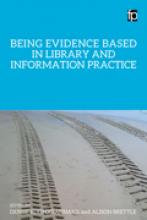Facet Publishing has released Being Evidence-based in Library and Information Practice
Press Releases
Atypon has added enhancements to Literatum, the online publishing platform for the professional and scholarly publishing industry.
Atypon’s universal content type technology, known as Digital Objects, assigns a DOI (digital object identifier) to any type of content or media, including blogs, news articles, videos, images, and interactive visualisations. Each digital object can then be tagged, indexed, packaged, targeted, promoted, bundled, and sold as easily as traditional content types like journal articles and book chapters.
Scientific publisher CABI has launched Open Books, supporting authors and collaborating organisations wishing to publish open access books
Facet Publishing has released Altmetrics: A Practical Guide for Librarians, Researchers and Academics, edited by Andy Tattersall.
Brill has launched Brill Research Perspectives, a new collection of review journals in international law, the humanities, and social sciences
Scopus delivers a comprehensive overview of the world's research output in the fields of science, technology, medicine, social sciences, and arts and humanities. As the largest abstract and citation database of peer-reviewed literature including scientific journals, books and conference proceedings, Scopus has intuitive tools that allow you to track, analyse and visualise research.
As the industry sees a shift in the way users search for content, librarians are in a unique position to influence the discovery process. The challenge is to make the content procured both searchable and accessible, so librarians are looking to content providers for help with discovery.
April 2016 marked the first anniversary of Nature Reviews Disease Primers. The journal has had a tremendous year, publishing 51 Primers and PrimeViews across all medical specialities, written by more than 400 leading experts.
From researchers searching for collaboration partners to academic research leaders and government agencies evaluating research impact, SciVal is the tool of choice for hundreds of academic, business and government customers worldwide.
PSI, an organisation that helps publishers eliminate subscription fraud and IP misuse, has announced the launch of a global registry of IP addresses.
On average, 58 per cent of IP ranges held by publishers are inaccurate, PSI has found. Because of this, a significant amount of content is open to unlicensed access, and libraries and publishers are likely to receive inaccurate usage statistics. Until now, the systems for keeping the IP ranges accurate and up to date have been cumbersome, time-consuming and inefficient for everyone involved.
CABI has launched a horticultural science internet resource covering tropical, subtropical and temperate crops and regions
RCNi Learning is a brand new interactive online learning resource designed to help nursing students prepare for clinical practice. It consists of 135 modules (which will grow to 185 next month), covering 43 topics including communication, cancer, acute care, wound care, mental health and many more.










